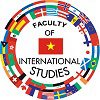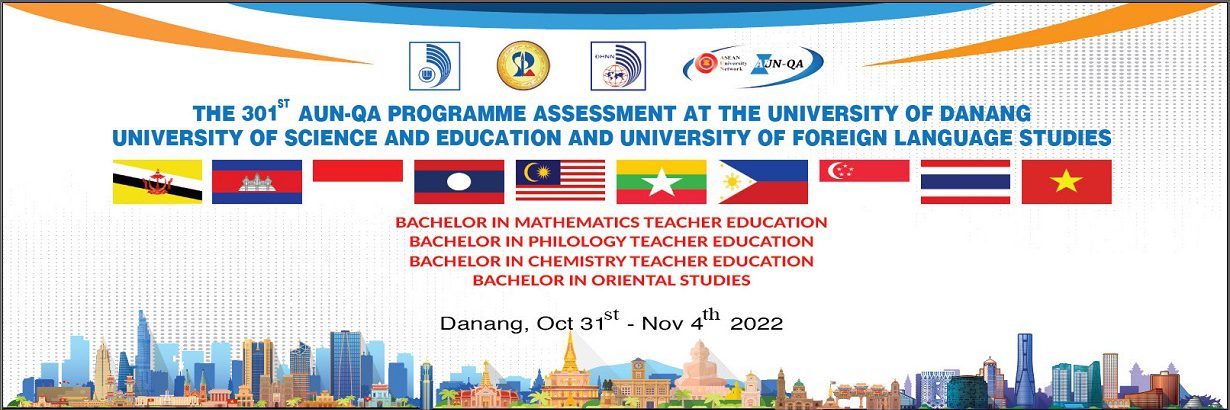BRIEF INFORMATION OF THE UNDERGRADUATE PROGRAM IN INTERNATIONAL STUDIES
HIGH QUALITY PROGRAM
- Program Objectives
1.1 General Objectives
The International Studies High Quality (ISHQ) undergraduate program is structured to include, not limited to, five components: politics; economics; laws; English language; technical and professional skills, which well express the multidisciplinary features of International Studies with a focus on Area Studies i.e. America, Europe, Asia, which well express the multidisciplinary features while promote the strength of the school’s long-term foreign language simultaneously. Especially, the Faculty of International Studies (FIS) allocates resources (human and material resources) with high quality to serve the traning program, applying the most updated teaching methods and program content to meet the professional needs of graduates in the era of economic integration.
1.2 Specific Objectives
– To develop students’ ability to apply basic and systematic knowledge of the above-mentioned five blocs of knowledge into their study and future work.
– To provide students with basic and systematic knowledge of world history, cultures and civilizations; international development studies; foreign policies and relations of Viet Nam.
– To develop students’ professional knowledge and skills to research, teach and work in foreign affairs and international development fields.
– To improve students’ English language skills including listening, speaking, reading and writing proficiently as these are keys to conducting academic research and accomplishing their future professional tasks.
– To develop students’ soft skills, namely communication, negotiation, documentation, teamwork, and information technology to prepare them to work in multidisciplinary and culture diversity environment and to promote life-long learning.
– To formulate students’ political and moral consciousness and good sense of serving the people.
- Program Expected Learning Outcomes
Graduates of the ISHQ program are expected to be equipped with good skills, abilities and attitudes to:
PLO1: apply knowledge of social sciences and humanities in working
PLO2: apply knowledge of international laws, economics, international relations, culture, history, area studies, international development studies in working.
PLO3: conduct scientific research related to international relations, and international development studies.
PLO4: evaluate political, economic and social movements and trends in regional and global contexts.
PLO5: organize activities related to foreign affairs and public relations.
PLO6: develop independent thinking, critical thinking and teamwork skills.
PLO7: apply communication skills in Vietnamese and English effectively in professional activities.
PLO8: construct life-long learning as a skill for comprehensive personal development.
PLO9: apply legal, professional, ethical, civil responsibilities and obligations in real life situations.
- Curriculum Structure
|
|
Knowledge bloc
|
Course Name
|
No. of Credits
|
|---|---|---|---|
|
3.1
|
General Knowledge
|
|
|
|
3.1.1
|
Marxist and Leninist Theories and Ho Chi Minh’s Thought
|
Basic Principles of Marxism and Leninism
|
3
|
|
Marxist-Leninist political economy
|
2
|
||
|
Revolutionary Paths of the Viet Nam Communist Party
|
2
|
||
|
Ho Chi Minh’s Thought
|
2
|
||
|
Scientific Socialism
|
2
|
||
|
3.1.2
|
English
|
Integrated English Skills A2.1
|
3
|
|
Integrated English Skills A2.2
|
4
|
||
|
Integrated English Skills B1.1
|
4
|
||
|
Integrated English Skills B1.2
|
4
|
||
|
Integrated English Skills B2.1
|
4
|
||
|
Integrated English Skills B2.2
|
4
|
||
|
Integrated English Skills B2.3
|
4
|
||
|
Advanced English
|
4
|
||
|
Translation
|
2
|
||
|
Interpreting
|
3
|
||
|
English Essay Writing
|
2
|
||
|
Specialised Graduation course (Advanced Professional English)
|
4
|
||
|
3.1.3
|
Social Sciences
|
Research Methods
|
2
|
|
Informatics
|
2
|
||
|
Social Statistics
|
2
|
||
|
Fundamental of Vietnamese Culture
|
2
|
||
|
Introduction to Law
|
2
|
||
|
Introduction to Sociology
|
2
|
||
|
History of World Civilizations
|
2
|
||
|
Introduction to Vietnamese History
|
2
|
||
|
3.1.4
|
Physical Education
|
PE 1 (Athletics)
|
1
|
|
PE 2 (Physical Exercise)
|
1
|
||
|
PE 3 (Students choose one of the following)
|
1
|
||
|
PE 4 (Students choose one of the following)
|
1
|
||
|
3.1.5
|
Military Training
|
Military Training
|
4
|
|
3.2
|
Specialized Knowledge
|
|
|
|
3.2.1
|
Fundamental Knowledge (Compulsory)
|
|
|
|
Introduction to Economics
|
2
|
||
|
Administrative Documents
|
2
|
||
|
Introduction to Area Studies
|
2
|
||
|
International Law
|
3
|
||
|
International Economics
|
2
|
||
|
Economic Geography of Viet Nam and the World
|
2
|
||
|
International Organizations
|
2
|
||
|
History of International Relations
|
4
|
||
|
World Political Institutions
|
2
|
||
|
3.2.2
|
Specialized knowledge
|
|
|
|
|
Compulsory
|
Viet Nam’s Foreign Policy
|
3
|
|
Introduction to International Relations
|
2
|
||
|
Introduction to International Development Studies
|
2
|
||
|
European history, culture and politics
|
3
|
||
|
Development Economics
|
3
|
||
|
Cultural Diplomacy
|
2
|
||
|
Intercultural Communication
|
2
|
||
|
American History, Culture and Politics
|
3
|
||
|
International Assistance
|
3
|
||
|
Asian History, Culture and Politics
|
3
|
||
|
Sustainable Development
|
3
|
||
|
Theories of International Relations
|
2
|
||
|
Global Issues
|
2
|
||
|
International Humanitarian Law
|
2
|
||
|
Electives
|
Viet Nam – EU Relations
|
2
|
|
|
International Law of the sea
|
2
|
||
|
International Relations in Asia-Pacific
|
2
|
||
|
Development Project Management
|
2
|
||
|
Contemporary Religious Issues
|
2
|
||
|
Introduction to Journalism and Communication
|
2
|
||
|
3.2.3
|
Supportive Knowledge (Compulsory/ Elective)
|
Soft skills
|
2
|
|
Foreign Affairs Operation
|
2
|
||
|
International Negotiation
|
2
|
||
|
Public Relations
|
2
|
||
|
Field trip
|
2
|
||
|
3.2.4
|
Internship and Graduation Thesis (or Graduation Exam)
|
|
|
|
Internship
|
2
|
||
|
Study 2 specialized graduation courses
|
8
|
||
|
or Graduation Thesis
|
8
|
||
|
Program TOTAL
|
132
|
||
- Job and postgraduate opportunities after graduation:
Graduates from the ISHQ program can:
– Accumulate and apply knowledge into further study and research at higher levels at domestic and foreign educational institutions.
– Lecture and conduct research on International Studies issues at universities, colleges and research institutes.
– Work in fields of foreign affairs in diplomatic agencies, international cooperation departments, the national defense and security agencies, the journalism and communication agencies at the central and local levels.
– Work at representative officers for international organizations, governmental and non-governmental organizations in Viet Nam and in other countries.
– Work at join ventures, state-owned and private enterprises.

